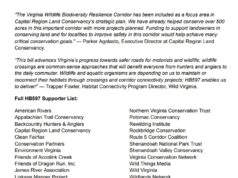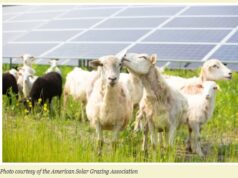by Glen Besa
If elected, how will you contribute to our collective efforts to reduce our carbon pollution by 45% over the next 12 years?
You and I will get to hear from a lot of candidates running for public office in this 2019 election year, and I am stunned by how few bring up the environment as an issue and how fewer still mention climate change in their stump speeches. When the environment is even mentioned it is usually a passing reference to clean air and clean water as a throw away line some where toward the end of speech. When I approach a candidate, one on one, to tell them I’m very concerned about climate change, I generally discover how uninformed they are on the issue.
Every respected climate scientist is telling us we’ve got 12 years to reduce our carbon pollution by 45%, and yet there is no serious policy discussion about how to get there. This goal comes out the Intergovernmental Panel on Climate Change Special Report, Global Warming of 1.5 Degrees Celsius, released last October. That report and the United States’ National Climate Assessment, released last November, document the impacts of climate change we are experiencing today and the disastrous impacts and costs we will experience in the near term if we fail to act.
When the scientists say 45%, they mean across all economic sectors: electricity generation, buildings, industry, agriculture and our largest source of GHG emissions, transportation. To reach this goal will require a transformation across all these economic sectors, and yet there is no plan and very little serious policy discussion about the paths to get there. The Green New Deal begins the discussion, but even there, very few political officials and candidates are willing to commit to the reductions in carbon pollution called for in the resolution that mirrors the IPCC 1.5 degree report.
Clearly voters, and Democratic voters, especially, know more and care more about climate change than the candidates running to represent us. This election season it falls to us to educate our candidates on this critical issue that you and I know represents an existential threat to our quality life in our lifetimes and most certainly in the lifetimes of our children.
Here is your charge: Every time you attend a forum or fund raiser for a candidate this year, or you find yourself speaking with a public official, ask them this question: If elected, how will you contribute to our collective efforts to reduce our carbon pollution by 45% over the next 12 years?
You can explain to them that this goal is the carbon pollution reduction settled upon by the best climate scientists in the United States and the world if we are to avoid the worst impacts of climate change. Of course, most of the candidates will be unable to answer that question because they’ve given so little thought to climate change’s impacts or solutions. But if we keep confronting them with this question, they may be prompted to give more thought to the matter. Better remind them not to ask Dominion Energy for the answer, because Dominion’s aggressive greenwashing absurdly claims that burning more fracked gas will solve the climate crisis.
Here are ten policy measures that our officials and candidates, once elected, could pass in the 2020 and subsequent General Assembly Sessions to get us moving toward the reductions necessary for Virginia to do its fair share to cut carbon pollution emissions:
- Require the development of a state Climate Action Plan for Virginia. Every four years, Virginia adopts a state energy plan. A Climate Action Plan would assess climate change impacts in Virginia and prioritize measures to reduce carbon emissions as well as climate adaptation strategies. As important as the issue of climate change is to the economic well being of Virginia, the state has no comprehensive plan for how it will reduce carbon pollution and adapt to a changing climate including sea level rise and severe storm events. This plan would also assess the environmental justice implications of various measures to reduce carbon pollution.
- Pass a Mandatory Renewable Energy Standard. Maryland just passed an RPS requiring 50% renewables by 2030. California mandates 60% by 2030 and 100% renewables by 2045. These are the kind of numbers we need to be striving for to meet the reduction targets outlined in the IPCC’s report.
- Repeal the numerous impediments to renewable energy in Virginia law by passing a Solar Freedom Act.
- Approve various measures and incentives to jump start the Offshore Wind industry in Virginia. Dominion has been sitting on a federal lease to develop 2000 MWs of offshore wind for more than 5 years and only has plans for 12 MWs as a pilot project. The 2,000 MW of offshore wind could create 10,000 jobs and develop a whole new industry. Other states and other countries are moving aggressively to develop offshore wind resources.
- Pass a Mandatory Energy Efficiency Resource Standard – The cheapest power is the power you don’t use. 22 states have passed mandatory Energy Efficiency Resource Standards.
- Approve full membership in the Northeast Regional Greenhouse Gas Initiative, a cap and trade program for carbon pollution from fossil fuel power plants. While Virginia is moving forward with regulations to allow our state to participate in RGGI, legislation would allow full membership with revenues from the program accruing to the state to support the transition to a clean energy economy.
- Adopt the Advanced Automotive Fuel Efficiency Standards currently in place in 13 states, including Maryland as well as DC. The quicker we electrify the transportation sector and build a grid that provides renewable energy to charge these vehicles, the quicker we can cut carbon pollution from our cars, buses and trains.
- Approve a Virginia building code with higher energy efficiency standards. According to a 2018 report by the American Council for an Energy Efficient Economy, Virginia ranks 26th with respect to energy efficient building codes. Strengthening efficiency provisions of our building code saves substantially on residential heating and cooling costs.
- Prohibit all new residential connections to fracked (natural) gas after 2022. The Netherlands has prohibited new residential gas connections and the UK and California are considering similar restrictions.
- Prohibit the construction of any new major fossil fuel infrastructure. New fossil fuel infrastructure wastes limited capital that could be invested in renewables and efficiency. Monopoly utilities like Dominion Energy will stick its captive customers (that’s us) with “stranded costs” associated with retiring gas plants and pipelines early. Unless and until cost effective carbon capture and sequestration technology is demonstrated at utility scale, we need to be rapidly weaning ourselves off of fossil fuels.
There are many other measures that should be considered to reduce Virginia’s carbon footprint. The key is to do something, and these ten measures are proven means to reduce our reliance on fossil fuels and cut our carbon pollution. After more than three decades of foot dragging and obstruction by the fossil fuel industry and their allies in public office, the sooner we get started addressing climate change, the easier it will be.
So the next time you see and hear a candidate for public office in this 2019 election year, make sure you raise the issue of climate change and ask them how they plan to address it. Then share this article or other resources to show them the way.
The opinions expressed in this post are the author’s alone, and do not necessarily reflect the opinions of any entities with which Glen Besa has been affiliated.


![Video: Ivy Main Says “the hostility to offshore wind is really just [Trump]; nobody else feels this way…he will be gone and then we will get back on track”](https://bluevirginia.us/wp-content/uploads/2026/02/axiosivymain-238x178.jpg)









